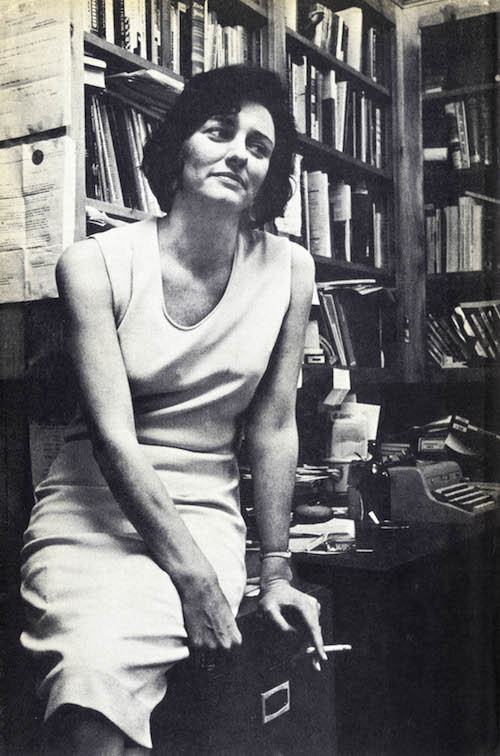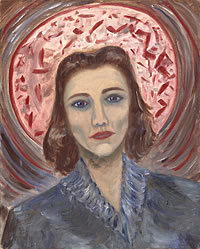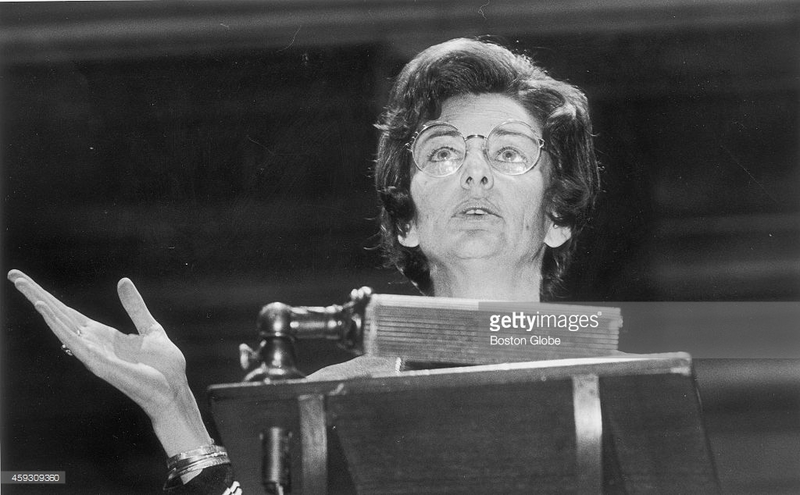Anne Sexton's Poetry Performances: 1959 and 1974
“Intention, text, context, reader- what determines meaning?” (66) asks Jonathan Culler, pointing towards a provocative debate on the role of various factors in interpreting literary works. Spoken poetry provides an additional element; if the orator is the reader, then the audience’s interpretation of the performance provides yet another layer of complexity. One may presume that interpretation of a work is simplified when an author reads his or her own poem, as the intention and reading should provide the same information. Nonetheless, as I will demonstrate via the analysis of Anne Sexton’s 1959 and 1974 performances of “Music Swims Back to Me”, distinctive, though not necessarily discordant, arguments arise in individual performances, suggesting that meaning is not immutable.
Anne Sexton was born in Newton, Massachusetts in 1928, and is known for the raw, confessional nature of her poetry (Encyclopaedia Britannica). She taught high school and collegiate writing in the Greater Boston area, and received Harvard’s Radcliffe Institute for Advanced Study Fellowship in 1960 (Poetry Foundation). Most significant towards the readings in question is her lifelong struggle with mental illness, which lead to multiple institutionalizations, alcoholism, and ultimately, suicide in 1974, six months after the second reading (Linda Wagner-Martin).
In the first performance (Dec. 8th, 1959), Sexton read multiple poems from her most recent book, To Bedlam and Part Way Back. Preliminarily, she states that Bedlam refers to the asylum, where some of the poems are set, and discusses her experience at a mental institution where a song kept playing on the radio. Only after purchasing the record and listening to the music upon her discharge was she able to remember her time in the hospital.
The reading itself was continuous, with solely brief and necessary pausing. The majority of the poem is spoken in a strong, detached voice as Sexton describes the institution. This contrasts the line “La la la, Oh music swims back to me,” (Sexton), which is spoken slowly and reflectively, as if only then recognizing her existence in this otherwise foreign place. Rhythmic and alliterative elements are emphasized moreso when describing the surround (“Four ladies, over eighty”; “the starts were strapped in the sky”) than when delicately speaking of herself (“I liked it and danced in a circle”). Ultimately, this distinction suggests an element of detachment, in which Sexton presents a view of the institution that is not entirely compatible with her presence in it. This may be due to her unwillingness to be there, underscored in the slight sense of indignation in the verbs “left” and “lock”, in which Sexton is not the subject but the object of the phrase. I argue that this reading inherently presents music as the sole connection Sexton discovered between the harsh reality of the institution and the tumultuous nature of her mental state, a linkage in a state of cognitive dissonance.
Alternatively, Sexton introduces her March 7, 1974 reading of the poem as one of her early poems on madness that aided in her establishment as a confessional poet. Overall, the reading is slightly slower, with both more and more lengthy pauses. She starts without demand, instead using an earnestly questioning voice to ask, “Which way is home?”. Moreover, there is an ethereal nature to the way Sexton describes the moving darkness. The rhythmic interpretation is identical to that of the first reading, featured prominently in descriptions of the environment. The first time she reads the “La la la” line, Sexton gains strength and certainty as the line continues, as if she is coming to the realization that the music is inducing a flashback. This state of remembrance is evoked again when she pauses, stating “I mean…it [the music] remembers better.” The second “La la la” line lacks emotion and is stated less soundly, as if the speaker is distancing herself from the memory. Finally, Sexton markedly pauses prior to asking the final question, “Mister?”, that ends the poem, which contrasts to the lack of any pause in the 1959 reading. I argue that this reading instead views the music as a linkage across time, a form of melodic memory connecting Sexton’s past experience in the institution with her physically and mentally more mature self.
While these two readings are neither contradictory nor mutually exclusive, there is significance in Sexton’s differing interpretations of her own works. Both are valid, and may reflect the internal state of the reader. Specifically, in 1959, the poem—and Sexton’s experience re-integrating herself into society following her institutionalization—was novel. Thus, it is unsurprising that she would solely be able to relate to her ordeal via music, an outlet that existed in both the hospital and the outside world. On the other hand, reading the poem in 1974 must have been reminiscent of reading an old diary entry to Sexton. It offers a description of music as a source of contextual recognition, taking her back to an earlier state of mind by prompting memory recall. Therefore, meaning is dynamic, and recorded spoken poetry serves as a useful tool to unravel its fluidity over time.
The audio recordings analyzed above can be found at: http://hcl.harvard.edu/poetryroom/listeningbooth/poets/sexton.cfm.
Works Cited
"Anne Sexton." Encyclopaedia Britannica. Britannica Academic. Encyclopædia Britannica Inc., 2016. Web. 07 Mar. 2016. <http://academic.eb.com.ezp-prod1.hul.harvard.edu/EBchecked/topic/537076/Anne-Sexton>.
"Anne Sexton." Poetry Foundation. N.p., 2015. Web. 07 Mar. 2016. American National Biography Online Feb. 2000.
Anne Sexton in 1966. Digital image. Poetry Foundation. Poetry Magazine, 2015. Web. 8 Mar. 2016.
Culler, Jonathan D. Literary Theory: A Very Short Introduction. Oxford: Oxford UP, 1997. Print.
Linda Wagner-Martin. "Sexton, Anne Gray Harvey"; http://www.anb.org/articles/16/16-01490.html;
Poet Anne Sexton speaks at Sanders Theatre at Harvard University. Digital image. GettyImages. Boston Globe, n.d. Web. 8 Mar. 2016.
Sexton, Anne, perf. Music Swims Back to Me. Anne Sexton. 1959. Woodberry Poetry Room. Web. 7 Mar. 2016.
Sexton, Anne, perf. Music Swims Back to Me. Anne Sexton. 1974. Woodberry Poetry Room. Web. 7 Mar. 2016.
Sexton, Anne. "Music Swims Back to Me." To Bedlam and Part Way Back. Boston, MA: Houghton Mifflin, 1960. N. pag. Harvard Library. Web. 07 Mar. 2016.
Sexton, Anne. Self-Portrait with Blue Blouse. Digital image. Harry Ranson Center. The University of Texas at Austin, n.d. Web. 8 Mar. 2016.


